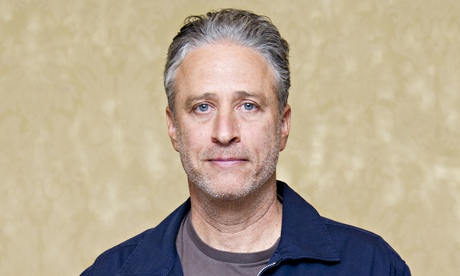
Your directorial debut, Rosewater, is based on Iranian-Canadian journalist Maziar Bahari’s book Then They Came For Me. It’s about the five months he spent in Iran’s Evin prison, when he was accused of being a spy after covering the 2009 elections. Why did you choose to tell this particular story?
When you get someone arrested, you start to feel closer to them. Maziar Bahari was interviewed on the Daily Show and was arrested shortly afterwards, alongside another fellow that we had interviewed, an old revolutionary called Ibrahim Yazdi, and a cleric named Abdi. Naturally we had a narcissistic response and jumped to the conclusion that this entire green movement somehow revolved around us. We were happily disabused of this notion very quickly but we did continue to form a very American response: we did this? We will fix this! Who should we invade? Later, after he was eventually released, I became friendly with Maziar, who is just a very warm and compelling individual. The project really stemmed from the relationship that Maziar and I developed.
Much of the film revolves around the relationship between Bahari and his interrogator Rosewater, played by The Bridge’s Kim Bodnia. What were your aims for that character?
What’s beautiful about Kim is that he can present the dichotomy I was looking for: a humanised interrogator. It would be very easy to portray Rosewater as a sadist and a monster, but these regimes are human and we need to start viewing them in that way in order to get a better understanding of them. When a prisoner is blindfolded, it is disorienting, but really it’s done for the benefit of the interrogator. You don’t want to beat the shit out of somebody whose eyes you might look into. I was looking to tap into that concept with this character. To have someone who could portray the looming malevolence, but also the vulnerability and a sense of humanity. Kim gives a beautiful rendering of that.
There are some great scenes in Tehran among the younger Iranians – their energy is infectious. On the Daily Show you’ve also been able to enthuse a younger audience about politics. What is the key to that?
I honestly think the key is to not think about them. So much is done with a contrivance to attract young people. There’s a news magazine show in the US called 20/20. They decided they were going to do an edgier version cos the kids, you know, they love edge. So the 20/20 youth version was called 20/20 Downtown because kids live downtown. It was the exact same show, with the exact same anchors, but they wore leather jackets and stood outside. There’s not a moment on the Daily Show where we think about whether this would appeal to a young person, an old person, a tired person, a liberal person. If you do, you become someone who is working backwards; someone who is attempting to achieve a goal that you’ve identified rather than creating something because you think it’s good.
Do you think kids are good at sniffing out what’s phoney?
At times. I don’t think they’re better than other people but they might have more time to think about it. When you’re young there’s the luxury of having the time to philosophise, in basements, with bongs. It’s a different mentality and it’s an enjoyable part of life, it’s a way of discerning who you are and it’s a process we all have to go through. Then you realise that it’s a process that doesn’t end. It’s a constant evolution.
Were you nervous about how this film might turn out?
It’s still just a movie. I’m doing a movie about torture. I’m not being tortured. In my original conversations with Maziar, the plan was to do this in Farsi and have an all-Persian cast. He was the one who said: “Jon, I really don’t want to do that. I want it to be in English and I want it to be as universal as it possibly can be.” I agreed with him. Because, ultimately, I have to own up to who I am. I am not [Iranian director Asghar] Farhadi. Somebody from that area is certainly going to see this film as a simplistic or reductive version of what their lives are. I just hope that for audiences that are not familiar it will be more nuanced and layered than they are used to and that’s the balance we tried to capture.

